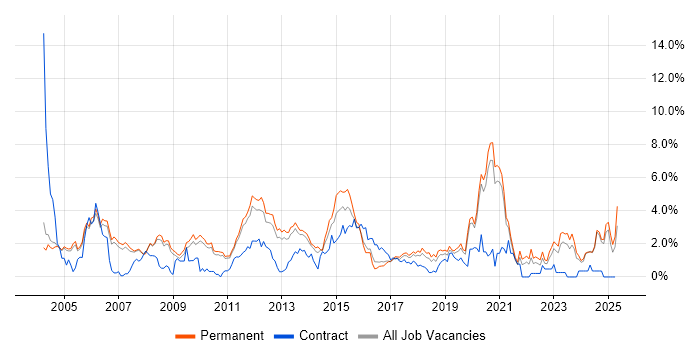Relational Database
Oxfordshire > Oxford
The table below provides summary statistics and salary benchmarking for jobs advertised in Oxford requiring Relational Database skills. It covers permanent job vacancies from the 6 months leading up to 8 January 2026, with comparisons to the same periods in the previous two years.
| 6 months to 8 Jan 2026 |
Same period 2025 | Same period 2024 | |
|---|---|---|---|
| Rank | - | 32 | 29 |
| Rank change year-on-year | - | -3 | +24 |
| Permanent jobs citing Relational Database | 0 | 9 | 5 |
| As % of all permanent jobs in Oxford | - | 3.52% | 1.83% |
| As % of the Database & Business Intelligence category | - | 20.45% | 9.43% |
| Number of salaries quoted | 0 | 4 | 5 |
| 10th Percentile | - | £69,750 | - |
| 25th Percentile | - | £73,125 | £47,500 |
| Median annual salary (50th Percentile) | - | £76,250 | £65,000 |
| Median % change year-on-year | - | +17.31% | +23.81% |
| 75th Percentile | - | £78,750 | £85,000 |
| 90th Percentile | - | - | - |
| Oxfordshire median annual salary | - | £75,000 | £57,547 |
| % change year-on-year | - | +30.33% | +15.09% |
All Database & Business Intelligence Skills
Oxford
Relational Database falls under the Databases and Business Intelligence category. For comparison with the information above, the following table provides summary statistics for all permanent job vacancies requiring database or business intelligence skills in Oxford.
| Permanent vacancies with a requirement for database or business intelligence skills | 25 | 44 | 53 |
| As % of all permanent jobs advertised in Oxford | 10.42% | 17.19% | 19.41% |
| Number of salaries quoted | 16 | 30 | 46 |
| 10th Percentile | £35,854 | £39,675 | - |
| 25th Percentile | £37,651 | £43,750 | £47,500 |
| Median annual salary (50th Percentile) | £51,250 | £60,000 | £55,000 |
| Median % change year-on-year | -14.58% | +9.09% | +10.00% |
| 75th Percentile | £85,313 | £78,750 | £78,438 |
| 90th Percentile | £90,000 | £100,000 | £85,000 |
| Oxfordshire median annual salary | £52,500 | £45,000 | £50,000 |
| % change year-on-year | +16.67% | -10.00% | - |
Relational Database
Job Vacancy Trend in Oxford
Historical trend showing the proportion of permanent IT job postings citing Relational Database relative to all permanent IT jobs advertised in Oxford.

Relational Database
Salary Trend in Oxford
Salary distribution trend for jobs in Oxford citing Relational Database.

